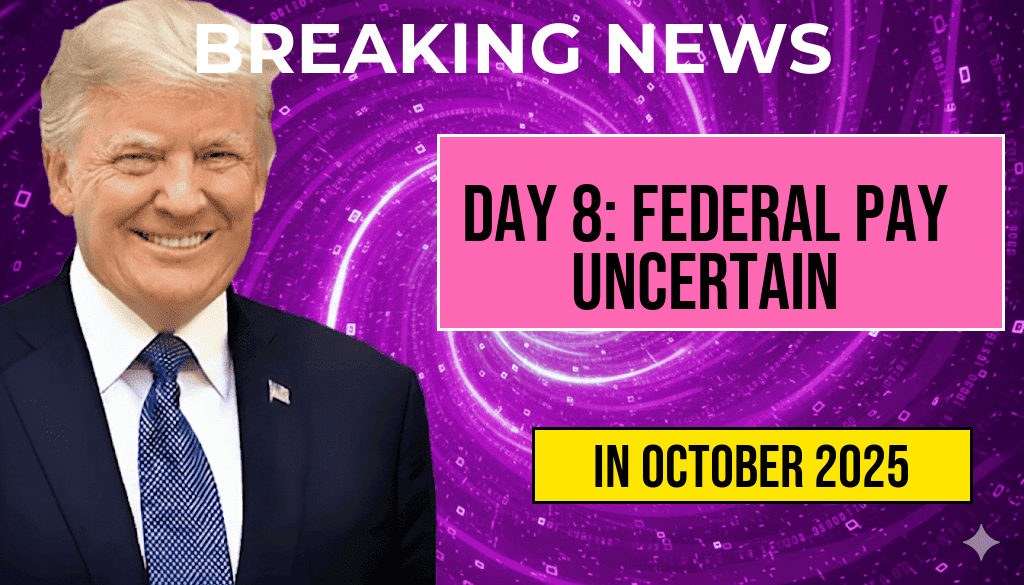As the federal government enters its eighth day of a shutdown, thousands of federal employees face increasing uncertainty about their paychecks amid ongoing political gridlock. While some workers continue to perform essential duties under temporary funding measures, many others have been furloughed without pay since funding expired last week. The question of whether federal employees will receive their full salaries remains unresolved, with lawmakers divided over the budget impasse. This stalemate threatens not only the livelihoods of government workers but also the functioning of various agencies critical to public services. The situation underscores the broader implications of partisan disagreements in Washington, as negotiations continue behind closed doors to find a resolution.
Background of the Shutdown and Its Impact on Federal Employees
The current government shutdown began after Congress failed to pass a new appropriations bill before the deadline, which was set for midnight on October 1. The deadlock stems from disagreements over funding levels and policy issues, including immigration, health care, and defense spending. As a result, approximately 800,000 federal employees have been furloughed or required to work without pay, impacting agencies such as the Department of Homeland Security, the Internal Revenue Service, and the Department of Agriculture.
What Does a Government Shutdown Mean for Employees?
During a shutdown, federal employees fall into two categories:
- Furloughed workers: Employees who are not considered essential are sent home without pay until funding resumes.
- Essential workers: Employees deemed critical, such as law enforcement and emergency personnel, often continue working but may face delays in compensation.
According to the Office of Management and Budget (OMB), employees required to work during a shutdown are generally eligible for back pay once appropriations are approved. However, this process can take weeks, leaving many workers uncertain about their immediate financial stability.
Legal and Financial Ramifications for Federal Employees
Will Employees Receive Full Pay?
Federal law stipulates that employees required to work during a shutdown are entitled to back pay once funding is restored. Nonetheless, the lack of current pay can cause significant hardship, including missed rent or mortgage payments, canceled plans, and mounting debts. Some agencies have advised their employees to seek emergency financial assistance or personal loans to bridge the gap.
| Employee Category | Work Status | Pay Status |
|---|---|---|
| Furloughed Employees | Not working | No pay until funding resumes |
| Essential Employees | Working | Pay deferred until appropriations are passed |
Legal Protections and Exceptions
While federal employees are protected by laws requiring back pay, some employees have expressed concern over the timing and process of receiving owed wages. Additionally, contractors and other non-federal workers affiliated with government projects may not receive compensation unless explicitly covered by contracts or specific legislation. The Department of Labor offers guidance on wage protections during shutdowns, but the reality remains tense for many workers relying on their upcoming paychecks.
Political Standoff and Prospects for Resolution
As negotiations continue, lawmakers remain divided over key issues. The Biden administration has urged Congress to pass a clean funding bill to reopen the government fully, emphasizing the economic and social costs of prolonged shutdowns. Conversely, some Congressional Republicans tie funding to policy concessions, complicating bipartisan efforts.
The Senate has proposed temporary funding measures to keep the government operational while negotiations proceed, but these have faced opposition from some House members. Leadership from both parties acknowledge the urgency but remain at an impasse, raising concerns about the potential for an extended shutdown.
Implications for Public Services and Economy
The shutdown’s ripple effects extend beyond federal employees, affecting services such as passport processing, housing assistance, and national parks. Economists warn that prolonged shutdowns can dampen economic growth, disrupt markets, and erode public confidence in government stability.
Resources and Support for Affected Workers
Federal employees seeking assistance can access various resources, including:
- Office of Personnel Management (OPM) guidance on pay and leave during shutdowns
- FedWeek’s coverage of federal furloughs and employee rights
- Local community organizations offering emergency financial aid
While the government has made efforts to reassure workers about back pay, the uncertainty and delay in receiving wages continue to create stress for many families.
Looking Ahead
The resolution to the current impasse remains uncertain, with negotiations ongoing in Congress. The longer the shutdown persists, the greater the strain on federal employees and the broader economy. As lawmakers debate funding options, federal workers await clarity on whether they will receive their full pay or face further financial hardship. The coming days will be crucial in determining whether a bipartisan agreement can be reached to reopen the government and stabilize employment conditions for those affected.
Frequently Asked Questions
Will federal employees receive their full pay on Day 8 of the government shutdown?
As of Day 8 of the government shutdown, federal employees are generally not receiving their full pay. Many employees are facing pay delays or partial payments, depending on congressional decisions and available funding.
What are the potential financial impacts on federal employees during this shutdown?
Federal employees may experience financial hardship due to missed or delayed paychecks. Essential workers might continue working without immediate pay, while others could be furloughed, affecting their personal finances and ability to meet financial obligations.
Is there any legislation that could restore full pay for federal employees during this shutdown?
Yes, legislation such as continuing resolutions or funding bills can help restore full pay to federal employees. Lawmakers often debate and pass such measures to suspend the shutdown and ensure staff compensation.
How long could the government shutdown last, and what are the implications?
The duration of the shutdown depends on congressional negotiations. A prolonged shutdown can lead to widespread disruptions, including delays in federal services and financial strain on employees.
What resources are available for federal employees affected by the shutdown?
Federal employees can access emergency assistance programs and financial support from various agencies. It is also recommended to stay updated through official government communication channels and seek financial counseling if needed.





